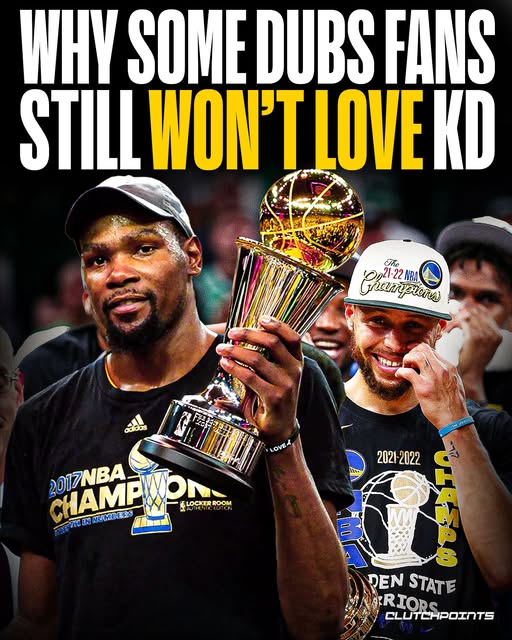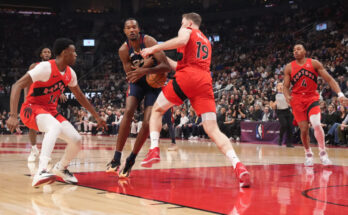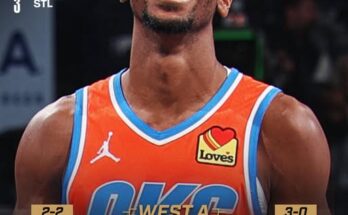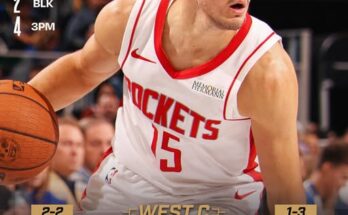Kevin Durant has a clear understanding of why some Golden State Warriors fans still haven’t fully embraced him, and he’s not holding back about it. When a fan on X asked why Dubs Nation hasn’t shown him complete love, KD fired back with a sharp response: “Them Finals MVPs, they will never recover.” Durant joined the Warriors in 2016 following the infamous Western Conference Finals loss with the Oklahoma City Thunder, and he wasted no time making an impact, leading the team to two championships and earning Finals MVP honors both times with dominant performances against LeBron James’s Cleveland Cavaliers.
Kevin Durant has never been one to shy away from speaking his mind, and when it comes to addressing the complicated relationship between him and a section of Golden State Warriors fans, he remains as straightforward as ever. Recently, the former Warriors superstar found himself in the middle of an online exchange after a fan on X posed a question about why Dubs Nation has not fully embraced him, despite everything he accomplished during his time in the Bay Area. Durant, who is widely regarded as one of the greatest scorers the game has ever seen, responded without hesitation or sugarcoating. His reply was as direct as it was telling: “Them Finals MVPs, they will never recover.” The statement, though short, carried a heavy weight and spoke volumes about how he views both his time with the Warriors and the lingering feelings of some fans who, even after multiple championships, never completely warmed up to him.
To understand the full depth of Durant’s comment, it’s necessary to revisit the circumstances that led to his arrival in Golden State back in 2016. At the time, Durant was coming off one of the most painful playoff exits of his career as a member of the Oklahoma City Thunder. That year, OKC had pushed the Warriors to the brink in the Western Conference Finals, taking a commanding 3-1 lead in the series. Yet, in one of the most memorable comebacks in NBA history, Golden State stormed back to win three straight games, eliminating the Thunder and denying Durant what seemed like his best shot at a title to that point.
Only a few weeks later, in a move that shook the entire basketball world, Durant announced he was leaving Oklahoma City to join the very team that had just defeated him. For Warriors fans, the acquisition felt like a dream come true — adding a top-five player to a squad that had just won 73 games in the regular season was almost unfair on paper. However, for many outside Golden State — and even for some within the fanbase — Durant’s decision sparked controversy. Critics accused him of taking the easy route to a championship, while others believed the move would tarnish his legacy.
Once Durant suited up for Golden State, however, his impact was undeniable. His debut season with the Warriors in 2016–17 culminated in one of the most dominant playoff runs in modern NBA history. The team went 16-1 in the postseason, steamrolling opponents on their way to the championship. Durant, facing LeBron James and the Cleveland Cavaliers in the NBA Finals, delivered one masterful performance after another, averaging over 35 points per game in the series. His scoring, versatility, and defensive presence not only earned him the Finals MVP trophy but also silenced many of the doubters who questioned whether he could deliver on the game’s biggest stage.
In the following season, Durant continued to prove his worth. The Warriors battled injuries and challenges throughout the year, but when the playoffs arrived, Durant’s postseason brilliance once again elevated the team. In the 2018 NBA Finals, another rematch with LeBron’s Cavaliers, Durant delivered one of the most iconic performances of his career, including a dagger three-pointer in Game 3 that mirrored a similar shot from the previous Finals. His dominance secured him a second straight Finals MVP award, putting him in elite company among players who have earned the honor in back-to-back seasons.
Despite all of this, there was always a sense among some Warriors fans that Durant was never truly “one of them” in the way Stephen Curry, Klay Thompson, and Draymond Green were. Curry, the face of the franchise, had been drafted and developed in Golden State, as had Thompson and Green. Durant, by contrast, was the superstar who came in at the peak of his powers to join a team that had already won without him. While his contributions were undeniable, the narrative persisted that the Warriors didn’t need him to win, even though his presence made them virtually unstoppable.
Durant, for his part, has long been aware of this perception. His reply on X — “Them Finals MVPs, they will never recover” — is more than just a casual clapback; it’s a reminder that, whether or not some fans fully accept him, he was the driving force behind those championship runs. Without his historic performances, there is no guarantee the Warriors would have emerged victorious against a Cleveland team led by one of the greatest players in NBA history. In Durant’s mind, those Finals MVPs are proof that he earned his place in Warriors lore, whether some fans like it or not.
The tension between Durant and certain parts of the Warriors fanbase became more visible during and after his final season with the team in 2018–19. That year was plagued with injuries and internal friction, including a highly publicized on-court argument with Draymond Green early in the season. While both players would eventually downplay the incident, the media coverage fueled speculation about Durant’s happiness in Golden State and his future with the team. The situation was further complicated by Durant’s season-ending Achilles injury during the 2019 NBA Finals, a devastating blow that altered the course of his career and left the Warriors short-handed in their loss to the Toronto Raptors.
After that season, Durant opted to leave the Warriors and sign with the Brooklyn Nets, closing the chapter on his time in the Bay Area. His departure was met with mixed emotions. Many fans expressed gratitude for the championships and unforgettable moments he brought to Golden State, while others seemed relieved to see the team return to its original core identity centered around Curry, Thompson, and Green. Durant, however, has never forgotten the fact that, even at the height of his contributions, there were fans who questioned his place in the Warriors’ history.
In many ways, Durant’s legacy with Golden State is unique. On paper, his achievements are unassailable: two championships, two Finals MVPs, multiple All-Star selections, and countless unforgettable performances. Yet in the realm of fan perception and narrative, his tenure remains polarizing. His latest comment underscores that he’s aware of the ongoing debate and is content to let his accomplishments speak for themselves.
From a basketball perspective, Durant’s time with the Warriors represented the peak of modern team dominance. His ability to seamlessly integrate into a system already built around elite shooting and ball movement made the Warriors an offensive juggernaut unlike anything the league had seen before. Defenses simply had no answer for a lineup that featured Curry, Thompson, Green, and Durant all on the floor together. The sheer gravity each player commanded created impossible matchups, and Durant often became the closer who could deliver a basket in any situation.
Off the court, however, Durant’s relationship with fans and the media was more complicated. He often pushed back against narratives he felt were unfair, whether through interviews or on social media. His willingness to directly respond to criticism, as he did in this recent X exchange, reflects both his competitive nature and his unwillingness to let others define his legacy.
For Warriors fans who still struggle with fully embracing Durant, the divide often comes down to loyalty versus achievement. Curry, Thompson, and Green embody the homegrown, draft-and-develop success story, while Durant is seen as the hired gun who came in, did the job at an elite level, and then moved on. To Durant, however, the bottom line is simple: banners hang forever, and his Finals MVPs are permanent reminders of his value to those championship teams.
Looking back, it’s hard to overstate just how impactful Durant’s decision to join Golden State was for the NBA as a whole. It shifted the balance of power in the league and set off a chain reaction of player movement and superteam formations. For three seasons, the Warriors with Durant were the measuring stick for every other contender. Even now, years after his departure, his time with Golden State remains a key chapter in both his career and the franchise’s history.
Durant’s recent comment is not so much a plea for acceptance as it is a statement of fact. He knows the debates will continue, but he also knows the record books don’t lie. The Warriors’ championships in 2017 and 2018 bear his unmistakable fingerprints. For fans still hesitant to give him his full due, Durant seems unconcerned. After all, as he put it, “Them Finals MVPs, they will never recover.” It’s a mic-drop moment, a reminder that whatever narratives people choose to cling to, the accomplishments remain etched in history.
In the end, the relationship between Kevin Durant and the Golden State Warriors fanbase is one defined by both gratitude and complexity. There will always be those who view his tenure as a golden era of dominance and others who see it as an asterisk in the team’s otherwise organic rise to the top. But whether he’s cheered or criticized, Durant’s legacy in the Bay is secured by the very thing he pointed to in his response — those Finals MVPs, earned on the sport’s biggest stage, against one of the greatest players to ever play the game. And that, no matter what anyone says, is something that will never fade from memory.



